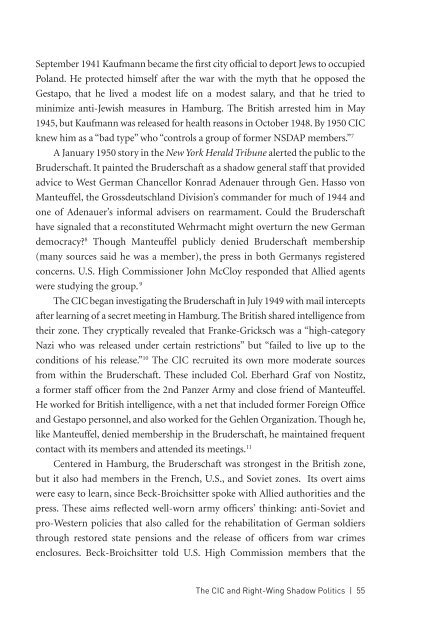hitlers-shadow
hitlers-shadow
hitlers-shadow
Create successful ePaper yourself
Turn your PDF publications into a flip-book with our unique Google optimized e-Paper software.
September 1941 Kaufmann became the first city official to deport Jews to occupied<br />
Poland. He protected himself after the war with the myth that he opposed the<br />
Gestapo, that he lived a modest life on a modest salary, and that he tried to<br />
minimize anti-Jewish measures in Hamburg. The British arrested him in May<br />
1945, but Kaufmann was released for health reasons in October 1948. By 1950 CIC<br />
knew him as a “bad type” who “controls a group of former NSDAP members.” 7<br />
A January 1950 story in the New York Herald Tribune alerted the public to the<br />
Bruderschaft. It painted the Bruderschaft as a <strong>shadow</strong> general staff that provided<br />
advice to West German Chancellor Konrad Adenauer through Gen. Hasso von<br />
Manteuffel, the Grossdeutschland Division’s commander for much of 1944 and<br />
one of Adenauer’s informal advisers on rearmament. Could the Bruderschaft<br />
have signaled that a reconstituted Wehrmacht might overturn the new German<br />
democracy? 8 Though Manteuffel publicly denied Bruderschaft membership<br />
(many sources said he was a member), the press in both Germanys registered<br />
concerns. U.S. High Commissioner John McCloy responded that Allied agents<br />
were studying the group. 9<br />
The CIC began investigating the Bruderschaft in July 1949 with mail intercepts<br />
after learning of a secret meeting in Hamburg. The British shared intelligence from<br />
their zone. They cryptically revealed that Franke-Gricksch was a “high-category<br />
Nazi who was released under certain restrictions” but “failed to live up to the<br />
conditions of his release.” 10 The CIC recruited its own more moderate sources<br />
from within the Bruderschaft. These included Col. Eberhard Graf von Nostitz,<br />
a former staff officer from the 2nd Panzer Army and close friend of Manteuffel.<br />
He worked for British intelligence, with a net that included former Foreign Office<br />
and Gestapo personnel, and also worked for the Gehlen Organization. Though he,<br />
like Manteuffel, denied membership in the Bruderschaft, he maintained frequent<br />
contact with its members and attended its meetings. 11<br />
Centered in Hamburg, the Bruderschaft was strongest in the British zone,<br />
but it also had members in the French, U.S., and Soviet zones. Its overt aims<br />
were easy to learn, since Beck-Broichsitter spoke with Allied authorities and the<br />
press. These aims reflected well-worn army officers’ thinking: anti-Soviet and<br />
pro-Western policies that also called for the rehabilitation of German soldiers<br />
through restored state pensions and the release of officers from war crimes<br />
enclosures. Beck-Broichsitter told U.S. High Commission members that the<br />
The CIC and Right-Wing Shadow Politics | 55


